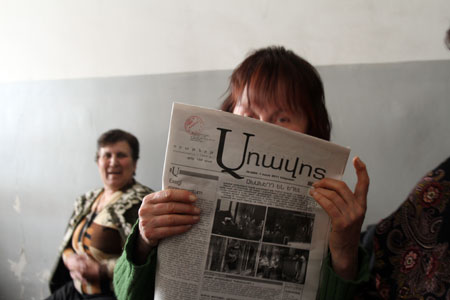aydqan mard es

Student repairing a book, July 2010
Ինչքան լեզու գիտես, այդքան մարդ ես:1
How many languages you know is how human you are.
One of the first things we did when we came to Goris was go to the library – being bookish people, a library was just the thing, we thought, to help us learn more of the language and learn more about the community. It was a few weeks before school started, and the library didn’t have a lot of visitors. Even in August, the reception room seemed cold, and with our partial Armenian we could not communicate more to the staff than our desire to borrow some books. The woman on duty – it must have been Alvard, but I really cannot remember clearly – assured us we could, but we would have to leave our passports at the library for as long as we had the book checked out: one passport per book. We left the library and I remember the sky being suddenly gray. We didn’t go to the library again for almost two years.
When we went again, though, it was to see a community volunteer project.2 A group of students from the local university had decided the state of the library was one the main things in community that needed some volunteer help, and they organized a group of high school students to come in and create shelf markers and repair books. There were more people in that reception room than I would have imagined possible and it was warm and bright and full of life. We got to talking to the head librarian about the students’ work, and she mentioned that what the library really needed was a reliable catalog, and so, just when we were trying to wind down our work, we found a new project. We should be receiving the funds that were donated within the next few weeks.3

One of the library workers was not enthusiastic about having her photo taken. Or rather she was, but pretending not to be.
What does this story about the library have to do with the quotation above? First off, the lovely lady in green in the photograph above is the person I heard that quotation from most recently: that is the primary connection. Secondly, I’ve been thinking about my interactions with the library lately4 and I’m struck by the peevishness of our reaction to the first trip to the library. That was, partially, a result of the exhaustion that comes along with trying to navigate a new way of life; it was also, partially a result of our limited language skills. Without knowing how to say that we couldn’t leave our passports, but still wanted to borrow books and ask whether there was any way for us to work around the library’s policy, we were satisfied – if that is the correct way of thinking about – with leaving the library powerless in the face of its administration, powerless in the face of its language. So it’s not so much a matter of how many languages you know, as how much of a language you know that determines the limits of your humanity.
- This is one of those Armenian proverbs one hears a lot, especially as a foreigner who speaks a smattering of Armenian. I’ve also heard it with քանի or որքան in place of ինչքան, or as: Քանի լեզու իմանաս, այնքան մարդ ես: The meaning remains more or less the same, however you want to pussyfoot around the translation of մարդ. Edited (some ten years later) to add that I saw someone Twitter translating this more literally – ‘How many languages you know is how many people you are’, which is a bit different. That is not what it seemed to mean in the context in which I encountered it, but it is very possible (indeed probable) that I misunderstood. [↩]
- Part of the US Peace Corps’s ‘V2’ (volunteerism) initiative to encourage volunteerism in the community. [↩]
- If you donated: thank you! [↩]
- Part of saying good-bye to the community has involved this kind of navel-gazing. [↩]
